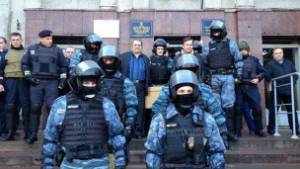Ceausescu’s removal as awareness-raising material for Ukraine’s leaders

The following is from a studio discussion on Radio Svoboda to mark Human Rights Day Arkady Bushchenko. Executive Director of the Ukrainian Helsinki Human Rights Union and Tetyana Yablonska from Freedom House Ukraine were asked to what extent human rights are respected in Ukraine.
Tetyana Yablonska: It’s very depressing to talk about human rights in a country where there is every possibility of somehow or other observing at least the main [rights]. And yet the main human rights body in the state should be the court and do we trust our courts? Can they capable of defending all our rights from birth to death?
Arkady Bushchenko: If we assess the 20-year history of independent Ukraine, then human rights have begun to be used at a rhetorical level, however it’s pretty hard to say that those who use them, understand what they actually mean. That is, respect for human rights in general is insufficient here.
Asked how much the authorities listen to human rights organizations, Tetyana Yablonska said that those in power don’t want to listen to anybody. Arkady Bushchenko said that he could not fully agree that they don’t listen. He believes that “in general human rights organizations do what the dissidents did in Soviet times, though of course conditions are better. However we do the same thing. In general we regard ourselves as the successors to that Helsinki movement. We try to tell the authorities honestly that there are problems. We try to engage in dialogue with the authorities, discuss these issues. “
While sometimes they’re heard, sometimes not, he believes that they “have certain means of influence via, for example, the international community, courts, international courts for impacting on State policy. Sometimes that works, sometimes it doesn’t”.
Tetyana Yablonska totally disagreed. She believes that defending a specific individual is not the way to protect human rights, that there needs to be a system which works. She stresses that the system is not working. She is however positive about the new Human Rights Ombudsperson (Valeria Lutkovska).
Arkady Bushchenko demurs over the level of pessimism, as well as with the assertion that defence of individuals’ rights is not an adequate method of reacting. Yes, the system needs to change, he says, but this is one of the ways of putting pressure on the system to change. Many reforms have been carried out precisely because human rights organizations supported certain cases in the European Court of Human Rights.
He cites reform of the system for legal aid, as well as the system of criminal justice, though clearly they will be watching to see what comes of the reforms. Something is happening, he asserts, and says that there are many cases where this is the result of specific judgements issued.
He asserts that even the choice of Ombudsperson was to some extent the result of pressure from civil society since the government’s initial candidate, whom he does not name, was quite different.
While agreeing that there remain major problems with socio-economic rights he stresses that these to a large extent depend on the country’s economic development.
Tetyana Yablonska mentions the lack of effort to create new jobs despite the number of unemployed, especially among young people. Even the electronic bracelets which the new Criminal Procedure Code envisages are to be produced in Israel. What a missed opportunity for creating new jobs.
She is also not convinced that the police will stop torturing detainees and says that the police force and the state as a whole are steeped in corruption.
Arkady Bushchenko agrees and notes that the case she mentions of the bracelets is also a violation of such political rights as that of access to information. It is a result of the Law on Public Procurement which creates procedure which is in no way transparent.
The first caller asked Mr Bushchenko about specific actions by the Ukrainian Helsinki Human Rights Union suggesting that these cannot presently be felt.
Arkady Bushchenko mentioned ongoing programmes:
The UHHRU network of public advice centres providing free legal assistance;
Members of the Union which is made up of 30 organizations have between them around 100 European Court of Human Rights judgements which have formed the base for many reforms;
The annual report on human rights in Ukraine, as well as alternative reports to the UN Universal Periodic Review;
He later stresses that he is not saying that all is well, but believes that one should look at the situation objectively. In his view, as compared with 10 or 20 years ago the situation is improving.
The two disagree on other points including the degree to which the public responds to such violations as torture. Once again Arkady Bushchenko is basically positive while Tetyana Yablonska considers public reaction to be pitiful or non-existent.
On the other hand, the fact that the government is now buying up water cannons for the police is an indicator that it is frightened of the people. The problem is that the people don’t understand that they’re a source of power.
In this both agree, with Bushchenko saying that the problem existed back in Soviet times. While now public reaction to certain events is weak because people don’t understand, because they’re caught up with survival, their own affairs.
Bushchenko stresses that this is due to Ukraine being a poor country, while Yablonska says that she believes that it’s also an issue of lack of conscience since there have been very poor countries where people demonstrated civic solidarity.
She suggests that she would show parliament everyday the film footage of Ceausescu being removed. “Maybe then those in power would somehow change their attitude to their people”.
Much abridged from the discussion here





